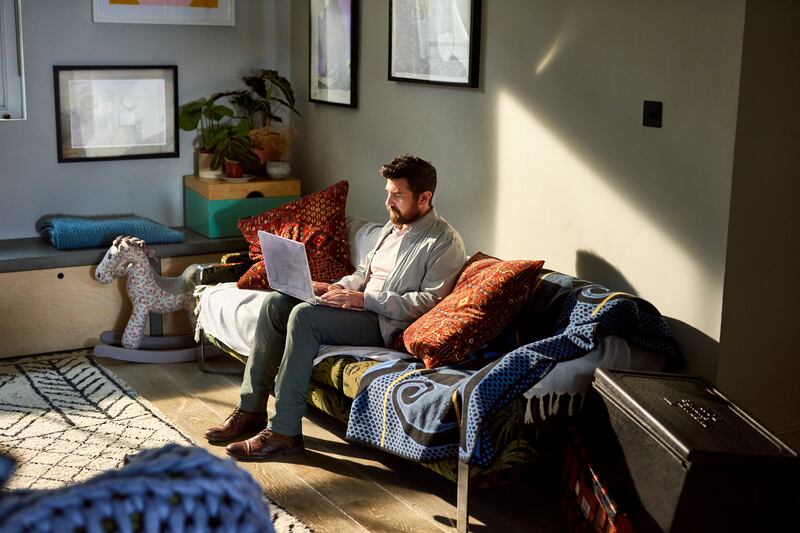The coronavirus pandemic ushered in a remote working revolution as millions of employees around the world left office cubicles to complete daily shifts from home in an effort to limit the spread of the virus.
The policy proved so successful that many businesses have retained a hybrid model, long after global lockdowns and other safety restrictions have ended.
But the clock may be ticking on working from home, according to a new report which indicates a widespread return to the five-day office routine is looming.
A study from financial services company KPMG, which took into account the views of more than 1,300 chief executives from the world's largest businesses, found 64 per cent believed a full return to office-based work by 2026 was on the cards.
The National spoke to companies and experts across the UAE who had divided opinions about whether we were set to see a return to pre-pandemic working habits.
“The wheel should not be turned back completely – where an effective mix of remote and office work is established, a hybrid culture will prevail,” said Oliver Kowalski, managing director at recruiter Hays Middle East.
“The implementation of hybrid working has been largely successful. Absolutely, challenges exist, but the advantages of maintaining hybrid working outweigh the disadvantages of reverting to a fully office-based model.
“In today’s world of work, employee well-being should be at the forefront of workforce strategies – healthy employees are productive employees.”
Hays Middle East offers staff hybrid working, with one to two days a week working from home with the option of flexible hours.
According to research carried out by Hays Middle East in late 2022, 49 per cent of organisations in the Gulf offer some work-from-home options.
The company is gathering information for its next salary guide survey. A representative said a slight trend was emerging towards fully office-based working models.
The Middle Eastern market has a unique take when it came to the merits of working from home versus the office, said Mr Kowalski.
“When it comes to hybrid and remote working, many organisations in the Middle East recognise the benefits and the positive effects it can have on work-life balance,” he said.
“Additionally, there’s an increased focus on sustainability in the region, particularly with the upcoming Cop28 [climate change conference].
“It makes sense to have a certain amount of work-from-home because emissions are automatically saved.”

Everyone back to the office?
Some companies in the UAE are not wasting anytime in bringing everyone back to the office full-time, believing it maximises efficiency and creates a better working environment.
One such firm is real estate agents Allsopp & Allsopp, who also operate a number of spin-off companies including one in the recruitment sector, giving them a total of more than 500 employees across Dubai.
“All six spin off-companies from the Allsopp & Allsopp group are office based and there is no work from home,” said Kameron Hutchinson director with Allsopp & Allsopp Recruitment and Executive Search.
“We believe this foster a better environment and improves collaboration.”
Another company that has brought all the staff back to the office full-time is UAE company EuroTech ME, which employs 40 in total.

“We have returned all of our staff to the office full-time, for a while now, as we had quickly witnessed that an increased level of social interactions positively affected collaborative work,” said founder and chief executive Michael Andersen.
“We see a lot of advantages to working in the office full-time such as a thriving team dynamic with an actual positive impact on employees’ motivation and even well-being.”
He said the company does allow for hybrid working but only on a case-by-case basis.
The debate over the value of remote versus in-office work has been given new impetus, with new research revealing lower productivity when working from home. Bloomberg reported in August.
Workers randomly assigned to work from home full-time were 18 per cent less productive than those in the office, according to the study from economists at the Massachusetts Institute of Technology and the University of California.
Also in August, Zoom Video Communications told its employees to report to its offices on a more regular basis.
Staff at the California company who lived within 80km from a Zoom office are required to work from there at least twice a week.
Home comforts
One company that is fully committed to the hybrid model that most adopted during the pandemic is Acorn Strategy, a communications firm that employs 60 people in the UAE, Hungary, Oman, Australia and Indonesia.
“We're committed to providing our entire team, regardless of location, with the ability to choose the mode that's right for them and what makes them most productive,” said Kate Midttun, founder and chief executive.

“We've witnessed the magic that happens when we blend remote and in-office work – it sparks creativity, bolsters work-life balance, and allows us to tap into global talent.
“It's all about embracing the best of both worlds: harnessing technology for efficiency while nurturing those invaluable in-person connections that fuel innovation.”
She added the company has no plans to return staff to the office permanently.
What the experts say
One of the UAE's leading employment experts said moving staff back to the office probably stemmed from a perception they would work harder there than at home.
A perception that was not necessarily correct, according to David Mackenzie, group managing director with recruiters Mackenzie Jones.
“There's a perception that if chief executives can get everyone back to the office they are going to make their staff work that bit harder which is going to improve share prices,” he said.
“That's a myopic view. When you talk to young talent now about what they value most in the workplace the answer is not a big salary but more flexibility.
“They [companies] want to start controlling their workforce a bit more because over the last couple of years the workforce sort of controlled itself.
“Maybe what some chief executives don't realise is a lot of people will vote with their feet if they're forced to come back to the office five days a week.”
Another expert said there was no right or wrong answer to whether hybrid working was better than working full-time in the office, but firms would do well to embrace new ideas.
“There's no one answer and you can go around in circles on this but the world is changing and hybrid working is where they seem to be changing towards,” said Claire Donnelly, senior consultant at Mike Hoff Consulting.







